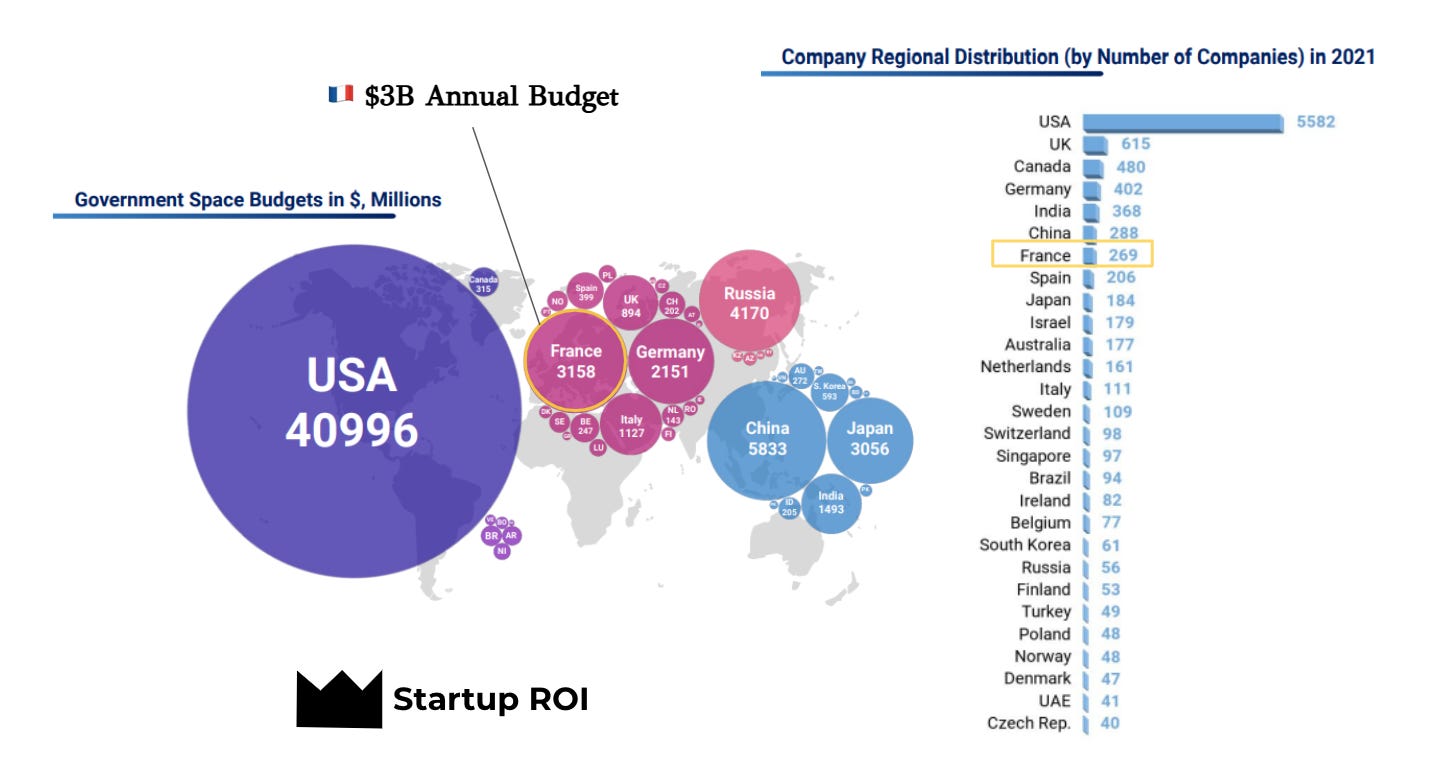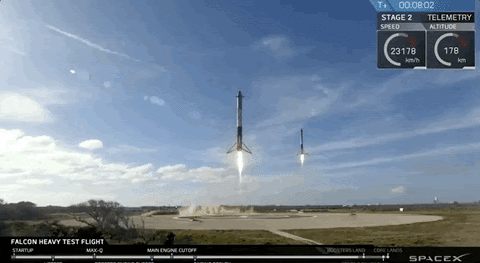Welcome to Startup ROI, where we explore global technology trends and how they manifest themselves in France 🇫🇷 . Whether you're an entrepreneur, investor or tech enthusiast, I'm glad to have you here! 📩 Get in touch
📌 If you are a startup interested in being featured or a VC interested in collaborating, please reach out directly: bonjour@startup-roi.com
New Here? Sign up for a weekly dose of French Tech:
🛰 Ground Control to Reader: We have a podcast!
The Failed Physicist
As a child, I, like many of my peers, had the vague notion that I was interested in space. At the time, this really only came up when a teacher (or other adult in my orbit) would ask what I wanted to be when I grew up. Astronaut sounded like a pretty solid answer, albeit a longshot. This idea of interstellar travel only started to materialize when I turned 13 years old and borrowed Stephen Hawking's "A Brief History of Time" from the school library. It addressed questions I previously imagined unanswerable and simultaneously opened up a whole new set of unknowns I was eager to understand. I wouldn't consider myself gifted in math, but I worked hard and comfortably moved through the advanced placement program in High School, wrapping up with BC Calculus as a senior. I had a mediocre Physics teacher but excelled simply because of my interest in the subject.
At university, I front-loaded the stale requirements so I could get to the good stuff: juicy electives like "Einstein's Space-Time" and Quantum Theory where I could start to explore the deeper, fundamental questions that had been brewing since my youth. I managed to pass Multivariable Calculus but hit a wall in Advanced Classical Newtonian Mechanics where numbers became letters and the "pony-tail twins" (no joke) were the teacher's pets. I grit my teeth until I received the score on my first exam. An F. Not only was this a blow to my physics career, but my ego. I had never failed at anything before. I regrouped and decided I could find middle ground with a Physics & Philosophy track, heavier on the theory than the math. I pursued it until I had the equivalent of a minor in the subject but ended up majoring in Economics.
Despite dashed dreams of commanding the next moon landing, I'm still passionate (bordering on obsessive) about space exploration. Just a decade ago, you might have argued I was born in the wrong decade, the zenith of space travel had passed us by. But that's changing, in large part due to the incredible advances in technology and the adventurous spirit of tech companies like SpaceX. To the layperson, space might feel like the plaything of the billionaire boys club, but in truth, it's far from it. Outer space provides myriad opportunities not just for exploration but science, industry, research, climate, discovery, travel and communications. It's completely justified to roll your eyes at the intergalactic dick measuring contest of the past several years. But there are true merits to the nascent industry that have transformational power to deliver significant improvements to the quality of life here on Earth.
Apollo 11 got us to the moon and back on 72KB of memory. For perspective, a 4GB iPhone has 7 million times more memory than the guidance computer on that spacecraft. Let that sink in. Now imagine the possibilities.
Aerospace Valley
What comes to mind when you think of a rocket launch? Houston, Texas? Cape Canaveral, Florida? Star City, Russia? Frankly, there are very few flagship locations, mostly solidified in memory from the early days of the Space Race. What you might not have known is that France is home to one of the most robust aerospace hubs in the world. The city of Toulouse is located in the Southwest of France, not far from the Spanish border in a region called Midi-Pyrenées. Zoom out a bit further and you reach Bordeaux (known better for its wine than wormholes) in the Aquitaine region. Thanks to a number of Grandes Ecoles, research parks and the former Airbus HQ, this lesser known French territory has become a hotbed for innovation, aptly named Aerospace Valley.

Here's a summary from Wikipedia:
The over 500 affiliated companies (including Airbus, Air France Industries and Dassault Aviation) are responsible for some 120,000 jobs in the aviation and space flight industries. In addition, some 8,500 researchers are active within the affiliated companies and institutions.The cluster's stated aim is to create 40,000 - 45,000 new jobs by 2026 Since its inception in 2005, the cluster has initiated some 220 research projects with a total budget of 460 million euros, including 204 million euros in government funding.
And it's not just a cluster of OEMs making parts for the world's dominant space-faring nations. France has the 4th largest national budget for space, behind the US, Russia and China. Likely a bit higher up in the rankings than you imagined!

Before we take off to explore some notable new French Tech companies, I wanted to touch on another valley, of sorts. The Death Valley.

You see, when I speak with people about innovation in space exploration, they tend to be underwhelmed by projects executed today mainly because they resemble achievements from half a century ago. In some regards, it's true. We went to the Moon in 1969 so what's the big deal if a private company sends astronauts to the International Space Station? If we could do it then, what's stopping us from doing it now? But it's important to look past the headlines and take a look at the underlying factors to grasp the scope of what's to come. Here's a close-up on how things have changed:
Man Power & Data
Space Race: 400K engineers for a decade for moon landing
Today: < 10K engineers for multi-purpose missions: satellites, payloads, ISS transport, Moon & Mars missions at SpaceX
Motivating Factors
Space Race: The Cold War
Today: Climate Change
Cost
Space Race: At its peak (4% US annual budget) in part because we basically dumped single-use rockets into the ocean
Today: Reusable rockets financed privately
Advancements in computing, new geo-political motivations, and substantially decreased costs have effectively reduced friction on progress, catapulting us out of the valley of death.
Industry in the Unknown
Besides our never-ending quest for knowledge and compulsion to explore, what practical business models can be supported (or invented) through easy access to outer space? It turns out there's a ton. The chart below illustrates the vast swath of categories from Navigation, Communication and Manufacturing to Security, Travel and something called "Space Medicine." Though imperfect, the curve represents three distinct phases that I'll name accordingly:
Establishment Era: near term, density of categories on left hand side of the chart solving problems around access to space, basic communications, and setting a foundation for robust, safe, and consistent work in outer space
Industrialization Era: middle of the long tail, we begin exporting industrial processes from Earth to outer space (immediate concern for climate) and solidify space-earth supply chain, eventually inventing new processes that could only be performed outside Earth's atmosphere
Exploration Era: once we've achieved parity with "old world" functions: communication, manufacturing distribution, transport supply chain etc. we turn our focus to exploring. This constitutes physical exploration (solar system, galaxy, beyond) as well as pushing the boundaries of scientific research

The Establishment Era logically comes first but the second two are not necessarily sequential and could evolve in parallel. There are four French Tech startups I'd like to spotlight today that are spread almost uniformly across this spectrum.

The Establishment Era will be characterized by getting things into space. Of course, we already do this, but it can be painful and complex. If you want to get your payload to space today you need to book space on a launch "bus" and ensure design specifications are aligned with the module (it can take years). It's kind of like the mainframe days of computing. Before you could just flip on another server with AWS, you had to buy the hardware, install it and configure it yourself. Loft Orbital plans to be the Infrastructure-as-a-Service company for space. Essentially, they buy inventory on satellite buses going to space in bulk and have built hardware and software to easily aggregate multiple customer payloads seamlessly. They operate the orbital missions too, providing neatly packaged data to the end customer. Their streamlined processes bring down the time to orbit to months. They just raised a $140 million round led by BlackRock.
Once you're in space, you might want to maneuver the craft or satellite for optimal positioning. Despite its somewhat suggestive name, ThrustMe builds mini thrusters designed to help you move satellites or constellations to position in space. Their ion engine allows for unprecedented performance.

As we transition from the Establishment to the Industrialization Era, the focus will shift from getting things into space to figuring out how to industrialize space at scale. For there to be progress on the industrial front, it will be necessary to have humans spending longer periods of time in space with sustainable, life support systems. This is where Interstellar Labs comes into play. They build next-generation, space-grade greenhouses to grow plants efficiently. The bio-pods look like something straight out of a movie, combining 3D printed materials and an inflatable membrane with high-pressure aeroponics and integrated water treatment system. All regulated with AI to automate crop selection and scheduling and to run predictive simulations. Let's just say Matt Damon's character in The Martian would kill for this thing.
When you think of space exploration, you probably conjure up an image of Elon Musk proclaiming he'll put humans on Mars within the decade. But there are varying degrees of space exploration. The Exploration Company, for example, wants to democratize space travel by facilitating small scale missions for space & non-space clients alike. They've built Nyx, a modular, reusable (and refuel-able) orbital vehicle designed for cargo, and one day humans. Today, if you want to run experiments or collect data in a 0G environment, it's costly and time-consuming. With Nyx, you can obtain that high-quality microgravity environment for 20% of the cost of the ISS. Fittingly, their first mission is titled "Champagne" (gotta love the French) which will be 3-6 months in Earth's orbit. But they plan to go to the Moon in 2028 with the ability to deliver payloads to the lunar poles and equator.
I saw their CEO, Hélène Huby speak at Station F recently:
The Research Vacuum
There's still so much we don't know about space. And perhaps more importantly, about ourselves. Research in outer space accelerates scientific discovery leading to better outcomes for us here on Earth. Beyond that, it inspires the next generation to study STEM and contribute to the next wave of scientific progress. There are both practical and aspirational aspects to our future in space exploration. And for the space haters out there, I'm confident that advancements in space and preservation on Earth are not mutually exclusive. We can do both. And they may even be complementary!
It's widely noted that the Big Blue Marble picture from Apollo 17 published in 1972 catalyzed decades of climate activism and environmental policy. It effectively provided at scale what is commonly known as the "overview effect" (the overwhelming gratitude for and desire to protect the Earth when seen from above by astronauts). Imagine the collective motivation if all of us had an opportunity to truly witness our home planet from above. The current space tech sector is poised to produce a catalyst of this type and unleash an era of exploration, prosperity and preservation unlike we've ever seen.











